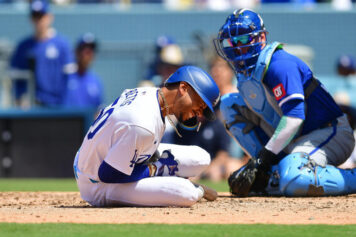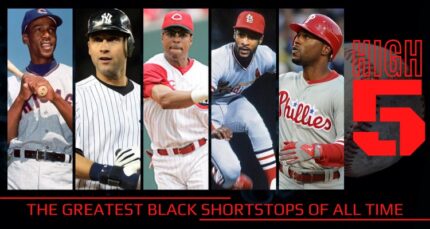The highest paid player in baseball isn’t even the most popular player on his own team.
The Los Angeles Angels and Mike Trout are completing a record-shattering contract worth 12 years and $430 million, the largest in sports history.
Breaking: Mike Trout and the Angels are finalizing the largest contract in professional sports history, a 12-year deal worth more than $430 million, sources familiar with the deal told @JeffPassan. pic.twitter.com/uZ7Ik7BGaj
— SportsCenter (@SportsCenter) March 19, 2019
The two-time MVP and statistical juggernaut is being lauded for the deal and universally hailed as deserving of that kind of scratch. Some are even suggesting that he’s underpaid.
When you consider how MLB values each Win Above Replacement, you can make a compelling argument that Mike Trout will be underpaid during this deal. By a lot.
— Michael Kay (@RealMichaelKay) March 19, 2019
MLB GOT IT WRONG AGAIN
Earlier in his career, Trout was one of the most underpaid players in sports. Now he’s overpaid.
Awarding the largest contract in sports history to a guy whose baseball prowess is legendary but his marketing power, personality, and big stage swagger is unimpressive. It doesn’t do anything for MLB. It’s hard to justify Trout’s contract beyond saying “he’s the best in the game.”
When it comes to investing hundreds of millions in a player, the investing corporation is usually sure that the move will return a profit. Despite the unprecedented stats he’s posted in his first eight seasons, Trout doesn’t transcend the game any more than Boston Red Sox MVP Mookie Betts or the Philadelphia Phillies newly-minted $330 million man Bryce Harper.
Trout might be $100 million better than those guys on the field (and that’s debatable) but his presence isn’t worth the yearly total of $36 million.
Why is Mike Trout not the popular face of baseball? In part, union chief Tony Clark says, it's because the league hasn't promoted him properly: “Mike is doing things that our game has rarely seen. It would be fantastic if more people knew about it." https://t.co/yAXOuxPxyk
— Bill Shaikin (@BillShaikin) July 17, 2018
MLB’s KING GOT NO JUICE
Trout has 2.5 million Twitter followers, but he didn’t even place in ESPN’s World Fame 100 list. You’d think that the highest paid player in pro sports would definitely make the list, which is based on a combination of social media following, endorsements and search function.
In fact, with all of these mega-contracts being signed in MLB, there was only one baseball player on that entire list. Harper barely made the cut at 99. Trout was nowhere to be found, which infers that he doesn’t have the kind of impact on the public dollar that his salary commands.
MLB Commissioner Rob Manfred says it’s Trout’s own fault that he’s not popular. The face of MLB doesn’t want to do commercials:
“Mike has made decisions on what he wants to do, doesn’t want to do, how he wants to spend his free time or not spend his free time,” Manfred said ipior to last year’s All-Star Game at Nationals Park. “I think we could help him make his brand very big.
“But he has to make a decision to engage. It takes time and effort.”
MLB has to take some of the blame for Trout’s anonymity. We haven’t even talked about postseason play and the World Series. That’s MLB’s major showcase and the league’s greatest opportunity to attract new fans and create unforgettable sports moments.
Trout hasn’t been able to capture that market because he’s only been to the playoffs once. MLB can’t have its highest-paid player and the greatest example of an MLB machine being a stranger to the postseason.
That’s just bad business all across the board. Trout has no signature moment. Right now, the only thing he’s really known for is being a dope ballplayer.
In addition to lacking charisma, Trout plays on the West Coast and most people in the Eastern baseball hotbeds are not staying up until 1 am to watch him play. So when it comes to metrics like Wins Above Replacement, Trout has no equals. When it comes to having the juice, he falls short.
BACK TO THE GRILL AGAIN
Angels owner Arte Moreno, is the first Mexican-American to own a major sports team in the United States. He’s known for dolling out huge contracts to superstars that didn’t materialize in wins or championships. Moreno signed Albert Pujols to a monster 10-year, $254 million contract. Pujols is entering the 8th year of that contract, his skills are declining and LA has made just one playoff appearance.
Moreno also signed former MLB star Josh Hamilton to a 5-year, $125 million deal in 2013. Hamilton played in 240 games, hit just 31 homers, before being traded to the Texas Rangers and was out of the league by 2015.
https://youtu.be/ZQGbgplvXhs
Moreno makes these kinds of splashes with his money. It’s what he does when his team falls too far from relevance. Nobody’s knocking Moreno’s choice to lock up the game’s best player long term. At the same time, public approval alone doesn’t make it a sound business move. This may sound blasphemous, but besides for being the consensus best player in the sport, what has the Mike Trout brand really done for baseball?
Does he inspire kids to play the game all around the world? Is he a household name that influences culture?
IT’S ALL IN THE NUMBERS RIGHT?
Just look at Trout’s jersey sales, which is a direct indication of a player’s popularity and market value.
In 2017, Trout had the 8th most popular selling jersey in MLB. Yankees star Aaron Judge had the top-selling jersey.
In 2018, Trout fell out of the Top 10. He’s not even the most popular player on his own team. Japanese baller Shohei Ohtani sells more jerseys than Trout. That’s just embarrassing.
#SporTriv: Top 5 2018 #MLB jersey sales: 1) #AaronJudge 2) #JoseAltuve 3) #JavierBaez 4) #ClaytonKershaw 5) #MookieBetts plus 15) #CodyBellinger and 16) #AndrewBenintendi pic.twitter.com/1vXwOUGCIF
— Deep Sports (@DeepSportsTV) October 23, 2018
The sales are an indication that Trout’s global appeal doesn’t command the kind of scratch the Angels awarded him.
WHAT ABOUT MOOKIE?
It also makes you wonder why Boston is playing hardball with Red Sox star Mookie Betts. Betts coming off of an MVP season and has finished in the Top 6 in the MVP voting the past three seasons.
He also led Boston to the World Series title in 2018 and has proven to be a clutch and reliable postseason performer. Mookie is considered by a growing faction of baseball observers to be the best player in the game or at least running neck and neck with Trout.
The Red Sox and Betts have been unable to settle on terms for a new contract, so Betts agreed to a record-setting, one-year, $20 million deal in January to avoid arbitration. Betts has said that he won’t sign an extension with Boston and wants to be “treated fairly.”
Mookie Betts contract: Boston Red Sox star expects to become free agent after 2020 season, wants to be ‘treated fairly’ https://t.co/i7hkcMEcdQ
— Christopher Smith (@SmittyOnMLB) March 20, 2019
One would hope that Boston would be just as eager to throw a record bag at their franchise Black player. There’s no reason why Betts — who is two years younger than Trout — can’t get a similar deal somewhere in 2020.
Only time will tell how Betts’ situation in Boston plays out. The city has a history of racism towards African-Americans. Blessing Betts with a historical contract would prove that the Red Sox organization is following through with its commitment to erase the city’s racist past and forge a new reputation.
Following Adam Jones incident, CC Sabathia talks about past experiences with racism in Boston https://t.co/7a3fNJgvUF pic.twitter.com/mBIJ3Kow62
— Bleacher Report (@BleacherReport) May 2, 2017
But former Yankee Mark Teixeira told ESPN that Trout’s deal shouldn’t be used as a measuring stick for the market.
“Mike Trout is an outlier, to me this doesn’t set a bar for new players, because nobody is Mike Trout. It’s not like the net guy is going to get a $450 million contract. I love Mookie Betts and I love Aaron Judge, those guys are great players, but Trout’s consistency puts him in a class by himself.”
The problem with Teixeira’s statement is that Betts and Judge are equally popular players on high-profile, major revenue-generating teams, both playing in towns with a voracious appetite for baseball. They will command similar contracts. Minimizing the impact of players of color to boost Trout, at a time when baseball needs a face that’s reflective of its changing demographics, is another backwards K for the future of the game.



